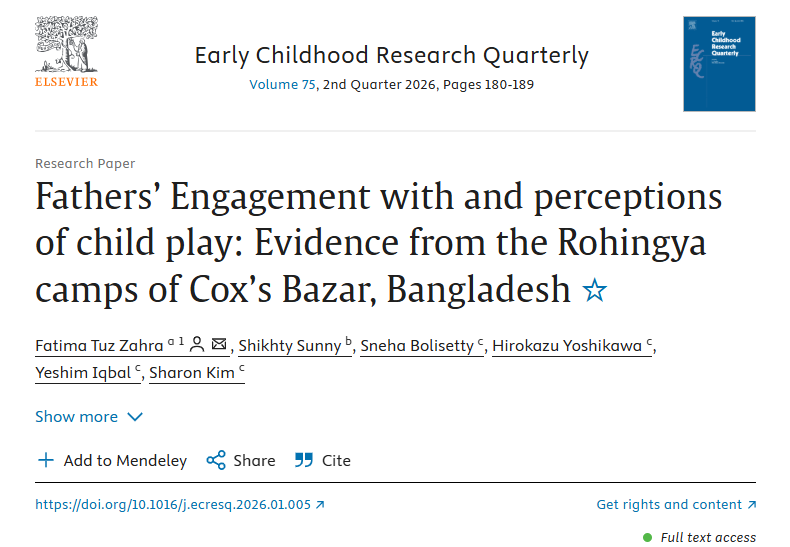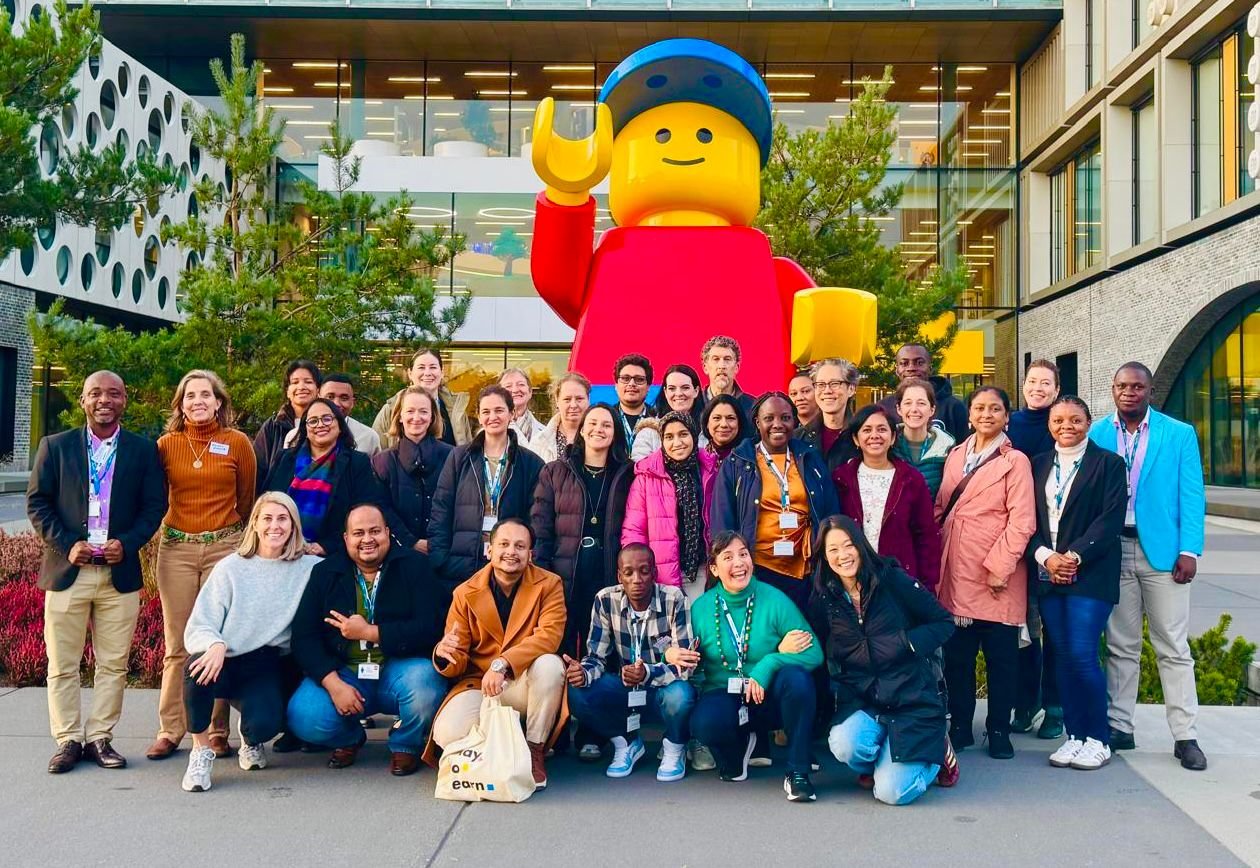Resources
The Play to Learn team has published a paper on Fathers’ Engagement with and perceptions of child play: Evidence from the Rohingya camps
Research on father engagement is heavily focused on Western families. Western-based programs to support fathers often do so in an individualistic manner, failing to address cultures in places where collective care is common. Limited existing research on fathers’ involvement in play emphasizes the influence of income and working status on fathers’ views on play. Overall, there is very little research on fathers' perceptions of play in refugee contexts, and there is no extensive study exploring this topic in the Rohingya context. In this context of forced displacement, we ask the following research question about the Rohingya fathers' perceptions of play.
Research Question:
How do fathers perceive children’s play in both structured (Humanitarian Play Labs) as well as unstructured (home and surrounding areas) play settings in the Rohingya camps in Cox’s Bazar, Bangladesh?
Engage team members participate in the project’s final Comunity of Practice convening
From November 3-6, 2025, Hirokazu Yoshikawa and Sharon Kim represented Global TIES for Children at the final Engage Community of Practice convening, organized by EDC and hosted at the LEGO Foundation headquarters in Billund, Denmark.
Over three days, partners from across the Engage portfolio shared evidence and lessons on strengthening student engagement in early childhood and primary education across diverse contexts.
The sessions focused on:
Insights from implementing and adapting the Engage tools
Trends emerging across countries and developmental levels
How data can drive program improvement and system-level change
This convening wasn’t a “show-and-tell.” It was hands-on, reflective, and honest about what it takes to embed child-centered, playful learning approaches into teaching and learning systems—and sustain them.
Lessons from an Implementation Study of Integration of Early Childhood Development (ECD)Information and Guidance into Well-Child Visits in Primary Healthcare Centers run by Jordan’s Ministry of Health
This study, led by Global TIES for Children at New York University in collaboration with the International Rescue Committee (IRC) research team, is an implementation study of a new intervention co-designed by the Ministry of Health (MoH) in Jordan, the IRC, and Sesame Workshop. This intervention seeks to increase families’ access to early childhood development (ECD) information and activities through the expansion of MoH midwife training beyond physical health and nutrition to other aspects of ECD, such as managing child behavioral challenges and supporting early learning,
and the incorporation of such additional content into well-child visits for children ages 0 to 5 years old.
Understanding Settings for Early Childhood Socialization: Evidence from the Rohingya Camps
In this brief, Global TIES researchers demonstrate the utility of rapid ethnography to understand the socialization context of Rohingya children living in Cox’s Bazar Camps, where factors such as economic instability, natural disasters, and the Covid-19 pandemic have continued to change the individual- and family-level environment for Rohingya communities. Results from rapid ethnographic data in conjunction with in-depth parent interviews highlight several key elements contributing to the socialization of young Rohingya refugee children, including: 1) supervision and care of children often extending beyond biological parents and immediate family; 2) agents of socialization and learning extending beyond biological parents and immediate family; 3) parents considering spaces near or around their homes to be unsafe, while children’s behavior indicate otherwise; 4) learning “pockets” or humanitarian play labs (HPLs) within household clusters providing unique opportunities for children to learn and play; and 5) HPL children having access to artifacts for socialization beyond improvised objects from the immediate surroundings.
Image credit:
Margaret Weir
@margotd1 via Unsplash.
Fathers' Perceptions of Play: Evidence From the Rohingya Camps Research Brief
This first brief in the NYU Global TIES for Children (NYU-TIES) series presents preliminary findings collected as part of the pre-pilot and pilot phases of one of their Play to Learn impact evaluations and a longitudinal study. The impact evaluation, led by NYU-TIES, investigates BRAC's flexible, hybrid home-visiting program in Cox’s Bazar which seeks to engage fathers as well as mothers and the longitudinal study features three-cohorts from prenatal and birth which follow young Rohingya children through their first years of life. The data in this brief looks specifically at Rohingya fathers’ perceptions of play.
Looking at Play Through the Eyes of Rohingya Children in Cox's Bazar
The second brief in our series aims to capture the point of view of young Rohingya children in order to provide context to how they may be mediating between their world of origin and the host society through play. Our data show that Rohingya children demonstrate a tremendous amount of spontaneous and creative activity in their everyday lives, despite the many challenges in the Cox's Bazar camps. This brief provides fresh perspectives into the remarkable resilience and creativity these young children possess.
Looking at Play Through the Eyes of Rohingya Children in Cox's Bazar
The second brief in our series aims to capture the point of view of young Rohingya children in order to provide context to how they may be mediating between their world of origin and the host society through play. Our data show that Rohingya children demonstrate a tremendous amount of spontaneous and creative activity in their everyday lives, despite the many challenges in the Cox's Bazar camps. This brief provides fresh perspectives into the remarkable resilience and creativity these young children possess.
Improving 21st-century teaching skills: The key to effective 21st-century learners
The development of competencies known as 21st-century skills are garnering increasing attention as a means of improving teacher instructional quality. However, a key challenge in bringing about desired improvements lies in the lack of context-specific understanding of teaching practices and meaningful ways of supporting teacher professional development. This paper focuses on the need to measure the social quality of teaching processes in a contextualized manner. We do so by highlighting the efforts made to develop and measure teacher practices and classroom processes using the Teacher Instructional Practices and Processes System© (TIPPS) in three different contexts: Uganda (secondary), India (primary), and Ghana (pre-school). By examining how such a tool can be used for teacher feedback, reflective practice, and continuous improvement, the hope is to pave the way toward enhanced 21st-century teacher skills and, in turn, 21st-century learners.










